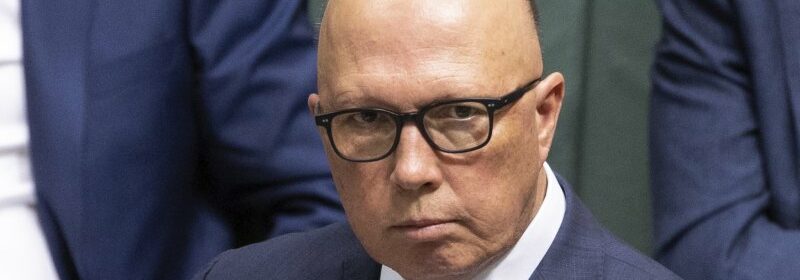Coalition could lose 35 seats as Millennials, Gen Z reshape politics

Save articles for later
Add articles to your saved list and come back to them any time.
The Coalition could lose the next six elections because Millennials and Generation Z voters aren’t shifting towards conservatives as they get older, prompting five Liberal MPs to urge the party to transform its relationship with younger Australians.
New analysis of voting trends by the Liberal-leaning Centre for Independents Studies has found that by the time people reached their early 50s, Baby Boomers (people born between 1946 and 1964) and Generation X (1965-1980) were more likely to vote for a conservative party than a progressive party.
Opposition Leader Peter Dutton is being warned the Coalition could lose another 35 seats with current voting trends.Credit: Alex Ellinghausen
But that trend is not being repeated among voters who are Millennials (1981-1995) or Generation Z (1996-2009). The percentage of Millennials shifting their vote to the Coalition is only increasing by 0.6 per cent at each election – half the speed at which Boomers and Gen Xers are shifting – which means Millennials will be in their 80s, rather than their 50s, before they are more likely to vote for the Coalition.
And for Generation Z, who were first eligible to vote in a federal election from 2014, support for the Coalition is falling, rather than increasing. This group is the least likely of any post-war generation to support the Coalition.
More Millennials and Gen Zers voted for the Greens than the Coalition at the last election and projecting the current trends forward, the paper warns that by 2040 – when 70 per cent of voters will be from post-1980 generations – the Coalition could lose another 35 seats.
Data used for the analysis was from the Australian Election Study, the leading study of political attitudes and voting behaviour in Australia. The paper examined the average primary vote for the Coalition among the overall electorate in elections held in 1966, 1969, 1980 and from 1987 to 2022.
Matthew Taylor, the paper’s author, said the modelling showed support for the Coalition among Millennials was increasing at a glacial rate compared to Baby Boomers and Gen X.
“If Gen Z support for the Coalition stays where it is and the generation that comes after has similarly low support then even if Boomers, Gen X and Millennials keep shifting towards the Coalition at the rates we have seen in the past, that still isn’t enough for the Coalition to return to government in the next six elections,” he said.
“For many Millennials, it’s a Greens to Labor transition under way rather than Labor to Liberals, as it was for Boomers and Gen X. And for Gen Z, support for the Coalition is softer in their mid-20s than what it was in their first election. Some of that support is reflected in them being more likely to vote for the Greens or minor parties.”
“There is a narrow path back to government for the Coalition. That road goes through Millennials and Generation Z; not around them.”
Frontbencher Dan Tehan, who has called for a major review of the party’s policies, said the party needed to find better ways to prove that Liberal values were core Australian values.
“For example, the Liberal Party is the party of homeownership and we are working to offer policies that encourage more young Australians into their first home,” he said.
Senator Andrew Bragg said the Coalition needed to be talking about solutions to issues such as this year’s one-off spike in HECS indexation and how superannuation works for young people. “We need to deploy economic policies which work for Millennials and Zoomers [Gen Z],” he said.
Flinders MP Zoe McKenzie said young Australians were “growing up in hyper-individualised contexts – an auto-play, after-pay environment – which differs greatly from the lives of their parents and grandparents, for whom the realisation of aspiration often involved planning, sacrifice and deferred gratification”.
“It is up to our generation of parliamentarians to work with the community to devise policy ideas that marry [Liberal] values and principles around the priorities and plans of Millennials and Gen Z.”
Senior Liberal adviser turned pollster Tony Barry believes the Liberal Party has come to accept the orthodoxy that younger people don’t vote for them, resulting in policies geared towards older voters in areas such as housing, superannuation, climate change and conservative social policy.
“Millennial voters are now taking longer to reach the sort of milestones that have historically led to more conservative voting patterns. They’re starting families later, and at a time when it’s increasingly difficult for them to enter the property market,” he said.
“Millennials locked out of the housing market feel they have no stake in the economy, so the Liberal Party’s legacy political strength of ‘good economic management’ is meaningless to them.”
Zoe McKenzie says the Liberals need to develop policies geared to the priorities and plans of Millennials and Gen Z.Credit: Alex Ellinghausen
Bridget Archer, the Liberal member for Bass, urged the party to “give regard to policies that go beyond the election cycle and consider future generations”.
Menzies MP Keith Wolahan said bold policy was essential but argued “who we are matters too”, emphasising the need to act with “character, compassion, and competence”.
Cut through the noise of federal politics with news, views and expert analysis from Jacqueline Maley. Subscribers can sign up to our weekly Inside Politics newsletter here.
Most Viewed in Politics
From our partners
Source: Read Full Article

